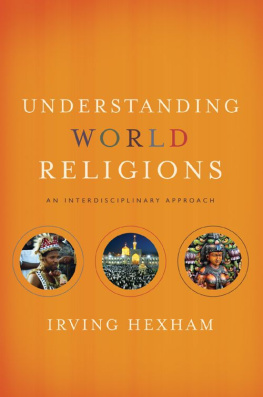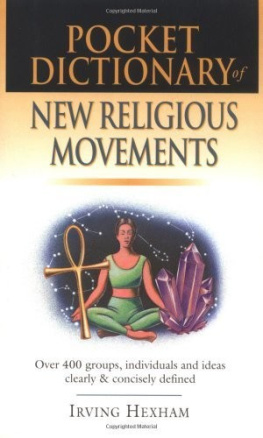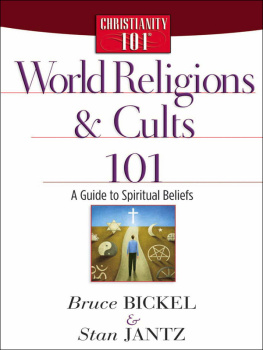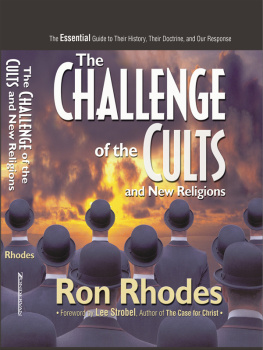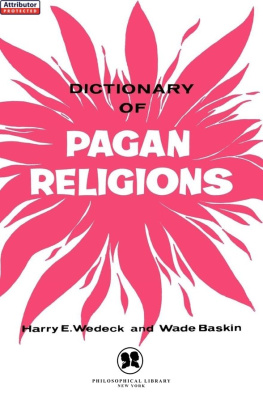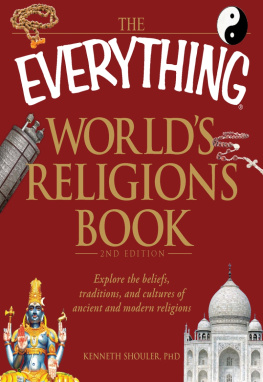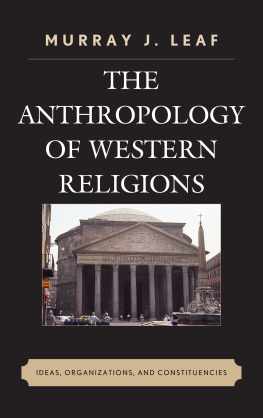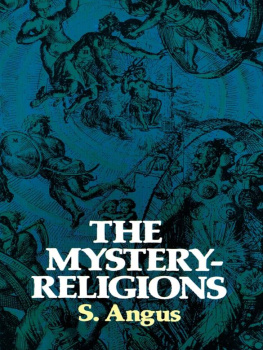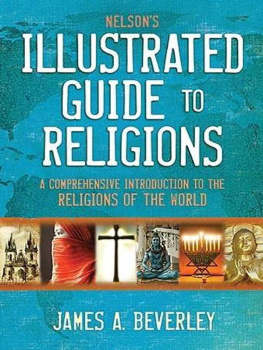New Religions as Global Cultures
Explorations
Contemporary Perspectives on Religion
Lynn Davidman, Gillian Lindt, Charles H. Long, John P. Reeder Jr., Ninian Smart, John F, Wilson, and Robert Wuthnow, Advisory Board
New Religions as Global Cultures: Making the Human Sacred, Irving Hexham and Karla Poewe
Church, Book, and Bishop: Conflict and Authority in Early Latin Christianity, Peter Iver Kaufman
Religion and Politics in America: Faith, Culture, and Strategic Choices, Robert Booth Fowler and Allen D. Hertzke
Birth of a Worldview: Early Christianity in Its Jewish and Pagan Context, Robert Doran
Explorations: Contemporary Perspectives on Religion
First published 1997 by Westview Press
Published 2018 by Routledge
711 Third Avenue, New York, NY 10017, USA
2 Park Square, Milton Park, Abingdon, Oxon OX14 4RN
Routledge is an imprint of the Taylor & Francis Group, an informa business
Copyright 1997 Taylor & Francis
All rights reserved. No part of this book may be reprinted or reproduced or utilised in any form or by any electronic, mechanical, or other means, now known or hereafter invented, including photocopying and recording, or in any information storage or retrieval system, without permission in writing from the publishers.
Notice:
Product or corporate names may be trademarks or registered trademarks, and are used only for identification and explanation without intent to infringe.
Library of Congress Cataloging-in-Publication Data
Hexham, Irving.
New religions as global cultures: making the human sacred
/ by Irving Hexham & Karla Poewe.
p. cm. (Explorations)
Includes bibliographical references and index.
ISBN 0-8133-2507-2 (hc) ISBN 0-8133-2508-0 (pb)
1. CultsHistory20th century. 2. CultsStudy and teaching
History20th century. 3. Anti-cult movementsHistory20th
century. 4. Religion and cultureHistory20th century.
5. Religion and sociology. I. Poewe, Karla O. II. Title.
III. Series: Explorations (Boulder, Colo.)
BP603.H48 1997
291.046dc21 96-51758
CIP
ISBN 13: 978-0-8133-2508-8 (pbk)
RODNEY STARK
To better appreciate why the authors wrote this book and what readers can hope to learn from them, consider a particular new religion. Like most of these groups, it can be identified as a cult because it displays three typical cultic features. First, it claims to have extensive new religious truthsa set of unique doctrines that are very different from those taught by the conventional churches. Second, the source of these new teachings is a young man who claims to have received them directly from God. Third, the leader requires obedience and encourages his followers to abandon their current lives and become full-time members.
Understandably, the parents of many of these followers are upset and angry about the exploitation of their children by this self-proclaimed messiah. Their worst fears are confirmed by well-known clergy who issue public warnings about the dangers of this cult and the dangers of all authoritarian religions led by deluded fanatics. The growing public outcry soon forces the government to act: The leader is crucified between two thieves.
This may seem a rather melodramatic introduction, but I intended it to force you to think about the word "cult" and about new religions. All of the world's major, respectable religions, including Christianity, began in obscurity. Each aroused angry opposition. Each would have been classified as a cult according to the three criteria outlined above.
The moral of this lesson should now be clear: One person's true faith is another's sinful heresy, and there is no easy answer to the question whether cults are dangerous. The pagan priests of ancient Rome thought the Christians were dangerous, and from their point of view they were absolutely right. The triumph of Christianity spelled the doom of paganism; in fact most pagan temples were remodeled into Christian churches or destroyed. Of course most Christians applaud this outcome, believing Christianity was destined to triumph because it is true. But all religious groups, old as well as new, think they are true. They can't all be right. So what's a person to believe?
These are issues that lie at the core of this book as it assesses new religious movements around the world. There may be many works on this topic, but this one offers a unique and extremely valuable perspective. The authors have spent years examining new religious movements. They are fully aware of the immense variety of groups and know the factual and moral complexities involved in characterizing them.
They wrote this book for students, especially those from Judeo-Christian backgrounds. In all times and places, young people are the primary source of converts to new religious movements. Partly for this reason, students have been the targets of a great deal of propaganda on the subject. To pursue this point, let's examine the "cult" section of any bookstore or, better yet, of a religious bookstore. Here we find dozens of books about new religions. Many offer descriptive accounts of new religious groups, their teachings, practices, history, and lifestyles. Some were written by scholars who were moderately attracted to the groupmost new religions attract a fringe of groupies. Others were written by former members, many of whom were out to get even. Still others were written in hopes of making money from sensational revelations about secret rites or other goings-onand these accounts are about as reliable as those about Bigfoot or Elvis in the weeklies sold at supermarket checkout counters.
Another common kind of book, found especially in Christian bookstores, disputes the teachings of new religious groups on theological grounds. For example, some books provide Christians with arguments to use when confronting missionaries from the Jehovah's Witnesses, Mormons, and Hindu groups. It is entirely appropriate for people to disagree about religion, and anyone has every right to denounce another's doctrines as false, unscriptural, illogical, or otherwise intellectually wanting.
Many other books adopt the perspective of the officials who judged Jesus. Their purpose is to warn readers against the "threat" of cults, and many propose means to suppress these deviant religious movements. These books do not focus on incorrect doctrines but specialize in lurid and fanciful stories about how the cults victimize their members financially, sexually, and psychologically; plan to subvert our religious lives; or seek to overthrow democratic government. Having raised sufficient alarm, the authors conclude that the cults must be stopped, usually by government repression. No one would deny that some religious groups at times victimize their members, for such groups come in an immense variety, as do secular organizations. Not all of them are respectable; some are led by disreputable people. But these groups are rare, and most of the "revelations" about cults are not true. It is curious that the most alarmist claims in the books that intend to protect Judaism or Christianity from cults are by secular writers who regard all religions as dangerous cults and who believe all sincerely religious people are brainwashed fanatics. A common suggestion by these anti-cult authors is that we enact laws restricting religious conversionfor example, by requiring a waiting period of many years and providing for the legal restraint of persons who do not obey. These laws, which have nearly passed in several states, would not simply prevent people from joining new religious movements but would keep them from joining any religion: not only the Hare Krishnas but also the Roman Catholics, Reform Jews, or Episcopalians (but it would remain legal for a person of religious background to join an antireligious group). What is one to make of "religious" writers who rely on such allies for their views?


